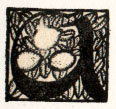 CERTAIN Sultan had a son of whom he was justly proud, for the young man was handsome and gay of temper, and had never been known to do an unworthy action. In the circle of the court he was the brightest star, and very sweet were the glances thrown him by the high-born ladies who served the Sultan. The Prince was courteous to them all, but he favoured no one, and as years went on, and he showed no signs of taking to himself a wife, the Sultan became disturbed.
CERTAIN Sultan had a son of whom he was justly proud, for the young man was handsome and gay of temper, and had never been known to do an unworthy action. In the circle of the court he was the brightest star, and very sweet were the glances thrown him by the high-born ladies who served the Sultan. The Prince was courteous to them all, but he favoured no one, and as years went on, and he showed no signs of taking to himself a wife, the Sultan became disturbed."My son," he said, "why do you not choose a bride? It is time you were married, for I should like to see you the father of children before I go to my rest. Surely it would be easy to find a mate amidst these fair women you see around you? I should experience no difficulty were I in your place."
The young Prince looked at him thoughtfully.
"I must have something more than any of them can give me, my father," he replied, "and if you really wish me to take a wife, I will go on a long journey, perhaps even round the world, and seek a princess whom I can love. She must be fair as the morning, white as the snow, and as pure as an angel."
"Well said, my son," replied the Sultan. "I wish you good fortune and a safe return." And without more ado the Prince departed.
The air was crisp with frost, and the glittering crystals of the snow threw back the radiance of the sunlight from bank to meadow. The waves that tossed and tumbled on the distant shore seemed to beckon him towards them, so he hastened to the coast, where he found a splendid vessel resting at anchor. While he was yet wondering how it had come there, and whither it was bound, invisible hands drew him on board, and, as his feet touched the deck, the anchor lifted, and the ship set sail.
For three days and three nights it glided swiftly over the sea, steered by a shadowy pilot who spoke no word. On the morning of the fourth day it came to a stop beside a little islet, and the Prince was amazed to see his favourite horse issue from the hold, ready saddled and bridled. Concluding that he was expected to land, he led the horse on shore, and when he turned round to take another look at the ship, it had completely vanished.
No sign of any habitation was to be seen, and the cold was so intense that he could scarcely hold the reins. In spite of this, he rode on and on, till at last he reached a small white house that stood by itself on the top of a hill, unsheltered from the wind. He knocked at the door with eager haste, hoping for the glimpse of a fire, and perhaps some food. His summons was answered by a venerable
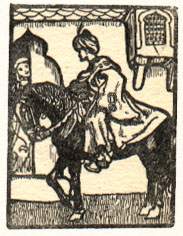 woman with scanty hair like wisps of snow, who stared at him inquiringly.
woman with scanty hair like wisps of snow, who stared at him inquiringly. "I seek a wife, good mother," said the Prince. "She must be the most beautiful princess in the world, and as good as she is beautiful. Can you tell me where to find her? "
The old woman half shut the door. "You will not find her here," she said, "for I am Winter, and this is my kingdom. My sister Autumn perhaps may help you, but I have no time for thoughts of love. You will find her if you go straight on."
The Prince thanked the old lady, and remounted his horse, hoping that Autumn would at least give him rest and refreshment. After a while he found that the snow had disappeared, and that luscious fruit now hung in clusters from the trees. The stubble of the corn tinted the fields with gold, and the squirrels were busily engaged in storing nuts for the winter. A little further on he came to a small brown house beside a wood, and, again dismounting, he knocked at the door. It was opened by a woman with abundant dark hair and eyes like sloes. Her cheeks were ruddy, and her look was kind; she did not, however, ask him in.
"What are you seeking, young man?" she inquired in a gentle voice.
"I seek a wife," he answered briefly.
"Ah," she exclaimed, "then I cannot help you. My name is Autumn, and I am far too busy gathering fruit to have time to spare for such things as love and marriage. My sister Summer is full of dreams, and she may find you what you want."
So saying, she shut the door, and as there was nothing else for him to do, the Prince resumed his journey.
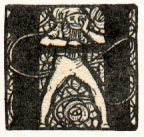 E noticed ere long that the grass by the roadside was very tall, and that the fields were heavy with corn ready for harvest. The air was so warm that it touched his cheek caressingly, and the sun shone down so hotly that he was fain to unloose his coat. He was very glad when at last he saw a small yellow house shaded by a group of trees. As he knocked at the door, he heard the sound of a distant waterfall, and the hope of quenching his thirst was more in his mind just then than the fairest wife in Summer's kingdom. His summons was answered by a stately woman crowned with auburn tresses.
E noticed ere long that the grass by the roadside was very tall, and that the fields were heavy with corn ready for harvest. The air was so warm that it touched his cheek caressingly, and the sun shone down so hotly that he was fain to unloose his coat. He was very glad when at last he saw a small yellow house shaded by a group of trees. As he knocked at the door, he heard the sound of a distant waterfall, and the hope of quenching his thirst was more in his mind just then than the fairest wife in Summer's kingdom. His summons was answered by a stately woman crowned with auburn tresses."I am sorry I cannot help you," she said, when he had told her the object of his journey, "for I too am very busy. Hasten you to my sister Spring; she is the friend of lovers, and will surely aid you."
So the Prince went on till he saw a little green house in a bower of lilac. Hyacinths and violets, jonquils, narcissi, and fragrant lilies-of-the-valley bloomed beneath the windows, and, when he knocked at the door, a little lady with flaxen hair, and eyes of soft deep violet, appeared on the threshold.
"Won't you take pity on me?" he asked her eagerly. "Your sisters sent me on to you. I seek a wife, who must be fair as the morning, white as the snow, and pure as an angel from Heaven."
"You ask a great deal," Spring told him, smilingly, "but I will do my best for you. Come in and rest–you must be tired and hungry." And to his great delight she ushered him into a long, low room, filled with the scent of flowers.
When he had feasted on bread and honey, and quenched his thirst with sweet new milk, she brought him three fine lemons on a crystal tray. Beside them was a handsome silver knife, and a quaint gold cup of rare design.
"These are magic gifts," she said, "so guard them carefully. Return at once to your own home, and make your way to the great fountains in the palace gardens. Having made quite sure that you are alone, take your silver knife and cut open the first lemon. As you do so, a lovely princess will instantly appear, and will ask you to give her water. If you at once offer her some in this golden cup, she will stay with you and be your wife, but should you hesitate, even for the space of a second, she will vanish into thin air, and you will never see her again."
"I am not likely to be so foolish," said the Prince, "but if I do, shall I have no wife at all?"
"You must then cut open the second lemon," Spring answered gravely, "and exactly the same thing will occur. If you hesitate this time also, and she too disappears, you will have one more chance with the third lemon. Should your wits fail you a third time, you will die without a mate."
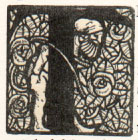 HE Prince would have thanked her for her kindness, but she waved him away with a smile and a sigh, telling him not to delay. Full of joyful anticipation, he rode once more through the kingdoms of Summer, Autumn, and Winter, and when he arrived at the coast found the same stately vessel awaiting his pleasure. The wind was favourable on his homeward voyage, and in a very short time he had once more gained the precincts of his father's palace. Giving his horse into the care of a groom, he hurried into the great gardens, and, when he had filled Spring's gold cup with water from the splashing fountains, cut open the first lemon. He had no sooner done so, than a most exquisite Princess appeared before him, and with a timid glance asked him to give her water.
HE Prince would have thanked her for her kindness, but she waved him away with a smile and a sigh, telling him not to delay. Full of joyful anticipation, he rode once more through the kingdoms of Summer, Autumn, and Winter, and when he arrived at the coast found the same stately vessel awaiting his pleasure. The wind was favourable on his homeward voyage, and in a very short time he had once more gained the precincts of his father's palace. Giving his horse into the care of a groom, he hurried into the great gardens, and, when he had filled Spring's gold cup with water from the splashing fountains, cut open the first lemon. He had no sooner done so, than a most exquisite Princess appeared before him, and with a timid glance asked him to give her water."I am thirsty," she murmured. "Will you not let me drink from your golden cup?"
The Prince was so lost in admiration that he could only gaze at her, and with a gesture of reproach the lovely maiden vanished. It was in vain that he lamented his stupidity. Do as he would, he could not call her back again, and with many regrets he cut the rind of the second lemon. Once more the gleaming spray of the dancing fountains took the form of a beautiful girl.
"Fair as the morning and white as snow!" cried the Prince in rapture, too delighted to heed her request for a cup of water. He did not regain his senses until she also had disappeared, when he again bewailed his neglect of Spring's injunctions. With trembling fingers he inserted the silver knife into the third lemon, and as the pungent odour of the golden fruit escaped into the air another Princess appeared before him. Closing his eyes, lest they might be dazzled by her exceeding beauty, he immediately offered the golden cup. The maiden raised it to her lips with a bewitching smile, and drained it to its dregs. The Prince laughed aloud for joy; now at last he had found the bride he sought.
No summer morning was fairer than she, for the whiteness of snow gleamed on chin and brow, and her expression was pure and gentle as an angel's. Drawing her down beside him on to a flowery bank, he held her hand and looked into her eyes.
"Will you be my wife?" he whispered, and to his delight she answered, "Yes."

"HE IMMEDIATELY OFFERED THE GOLDEN CUP"
"Your robe is not worthy of you, dear love," he cried. "If you wait for me here, I will fetch you one of rich white satin from my father's palace, and a rope of pearls to twine around your neck."
But the Princess knew that she needed no ornaments to enhance her beauty, and she did not wish him to leave her. Her lover, however, was so insistent that she consented to stay by the fountains while he went home, and, more in love with her than ever, he hurried away.
Now the Princess was very timid, and as the Prince tarried long she grew frightened of being alone. So she stretched out her arms to a tree above her, and swung herself up that she might nestle amidst its branches. The foliage hid her slender limbs in their flowing draperies, but her exquisite face gleamed like a flower from a setting of glossy leaves, and was mirrored in the deep basin of the fountains. A very plain looking serving girl who came to fill her pitcher caught sight of its loveliness, and, since she had never gazed into a mirror, believed it to be her own.
"Oh, how very handsome I am!" she murmured. "I am far too beautiful to do the bidding of any mistress. I will never draw water again." And flinging the pitcher from her, she strutted home with the air of a peacock.
"Why have you come back empty-handed, Deborah?" inquired her mistress.
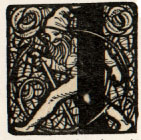 HAVE seen my face in the fountain," was the reply, "and I am much too lovely to fetch and carry like a poor slave."
HAVE seen my face in the fountain," was the reply, "and I am much too lovely to fetch and carry like a poor slave." "Why, you are as plain as pudding!" her mistress retorted sharply. "Go back at once, and do as you are told."
Deborah fetched another pitcher and went back to the fountains, grumbling the while. Again she caught sight of the Princess's face reflected in the water, and again her swarthy features became distorted with pride.
"It is true!" she cried. "I am lovely as a dream. I will marry a prince, and live in a palace." With this she threw down the second pitcher, and flounced into her mistress's presence with such an assumption of dignity that that lady burst out laughing.
"If you only knew how plain you are," she cried, when she could speak, "you would never talk such ridiculous nonsense." And daring her to return again without the water, she handed the mortified woman a third pitcher and sent her back to the fountain.
"But I am handsome," she cried triumphantly. "As handsome as a queen."
She spoke so loudly that the Princess heard her, and her laugh rang out like a peal of bells. Looking hastily up, the Deborah saw her in the branches, and disappointed vanity rendered her almost speechless.... Her mistress was right then, after all, and the lovely vision she had seen in the water was not the reflection of herself. As she stared upward with dilated eyes, there came to her thoughts of revenge.
"I will make her suffer for this," she murmured, but wreathing her wide lips in a false smile, she bade the Princess "Good morrow."
"Why do you hide in a tree, lovely lady?" she asked her gently.
"I am waiting for my Prince, who has gone to fetch me a satin robe, and a rope of pearls to twine round my neck," answered the Princess shyly.
"Your golden hair has been tossed by the wind," remarked the servant girl. "Let me come up beside you, and I will make it smooth. It will not do to look untidy when your Prince arrives!"
"How kind you are!" said the Princess, and as she bent her silken head towards the servant girl, the treacherous woman stabbed it with a long sharp pin.
The Princess fell back, faint with pain, but before her body could touch the ground she turned into a snow-white pigeon, and flew off uttering plaintive cries.
The serving girl took her place in the tree, and when at last the Prince appeared, bearing a satin robe and a bridal veil, it was she whom he saw looking down on him.
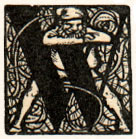 HERE is my sweet Princess?" he asked. "She is fair as the morning, and white as snow. What have you done with her?"
HERE is my sweet Princess?" he asked. "She is fair as the morning, and white as snow. What have you done with her?"
"Alas! dear Prince," answered the plain girl sadly, "while you were away an enchantress came and changed me into my present form. When you have proved your love by making me your wife, I shall, in three days' time, once more become a fair and beautiful Princess; but if you desert me, I must remain as I am for ever."
Although he missed his lovely Princess, the Prince was a man of honour, and would not break his word. Calling the ladies who were waiting in the carriage which he had brought to convey his bride to the palace, he bade them array her in the satin gown, and, pretending not to see their astonishment, drove back with her to his father, introducing her as his promised wife.
The Sultan was naturally surprised at her appearance, but when the Prince explained to
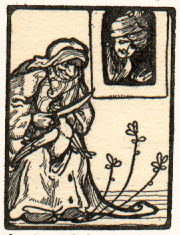 him how matters stood, he agreed that he must marry her, and hope for the best.
him how matters stood, he agreed that he must marry her, and hope for the best.While the father and son talked thus together, the serving girl wandered over the palace, giving unnecessary orders to the servants, and making herself hateful to all. She even ventured into the great kitchens, and commanded the chief cook to prepare rich viands for her wedding ceremonies. As she issued her orders in a loud, harsh voice, she passed by the window, and noticed a slim white pigeon sitting on the sill.
"Kill me that bird," she cried, "and cook it for my supper."
Not daring to disobey her, the chief cook killed it immediately, plunging a sharp knife into its snowy breast. Three drops of blood fell from the windowsill into the courtyard, and a tiny seedling sprang from each of these. As if a fairy had waved her wand, they grew into trees of fragrant blossom, and in an instant the blossom turned into golden lemons.
Meanwhile the Prince was seeking for his bride, for since he had set himself so distasteful a task, he wished to perform it well.
"She is in the kitchen, your Royal Highness," he was informed by one of his shocked courtiers, and in going to meet her, the Prince passed under the lemon-trees. The sight of their fruit brought him a ray of hope, and gathering three of the finest that he could find, he hastened with them to his own room, where, having filled the golden cup with water, he plunged the blade of the silver knife into the rind of the first lemon.
As before, a beautiful girl appeared, and stretched out her fair hands for the golden cup.
"Ah, no!" he cried. "You are very charming, but you are not my Princess."
He cut the rind of a second lemon, and as he did so the second Princess took form before him. He shook his head at her mute entreaty for a cup of water, and she too disappeared. Then he cut the rind of the third lemon, and lo, his own Princess was once more in his arms!
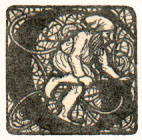 REAT was the joy and relief of the old Sultan when he heard from the Prince that this beautiful girl was his real bride, but he listened with a frown of anger as she told them all that had happened when her lover left her by the fountain. He ordered the serving girl to be immediately brought before him, and, regarding her very sternly, asked her what she would think a fitting punishment for an affront offered to the future wife of his dear son.
REAT was the joy and relief of the old Sultan when he heard from the Prince that this beautiful girl was his real bride, but he listened with a frown of anger as she told them all that had happened when her lover left her by the fountain. He ordered the serving girl to be immediately brought before him, and, regarding her very sternly, asked her what she would think a fitting punishment for an affront offered to the future wife of his dear son."Nothing less than death," declared the spiteful girl, "and death by burning. Let the offender be cast into your Majesty's oven, and the great door shut."
"Madam, you have passed sentence on yourself," replied the Sultan dryly, and, shrieking with terror, the serving girl was led away.
But the sweet Princess would not let her suffer.
"She is but a poor ignorant woman." she said, "Set her free, I entreat you, and let her go. This is the boon I ask you for my wedding gift."
The Sultan could not refuse his new daughter's first request, and the Prince regarded her fondly.
"I saw you were fair as morning, and white as snow," he murmured, "and now I know that you are sweet as an angel."
And though the years to come brought him trouble and sorrow as well as joy, he was indeed blest. Beloved of all, his Princess wielded a gentle sway, and he never saw the fruit of a lemon without sending a grateful thought to Spring for the magic gifts by which he had fared so well.
"The Three Lemons." from: Folk Tales From Many Lands. retold by Lilian Gask published in 1910
original story can be found here This story has been, for the most part, left as it appeared in the 1910 books I have changed a few descriptive words.
Lemon Turkish Delight seemed to be just the right treat to make after this marvelous tale !
Meyer Lemon Turkish Delight
(what is Turkish Delight? ask Wiki!)
Ingredients:
- 3 (1/4 ounce) envelope unflavored gelatin
- 1/2 cup cold water
- 2 cups sugar
- 1/8 teaspoon salt
- 1/2 cup hot water
- 2 large meyer lemons, juice and grated rind
- yellow food coloring (optional)
- confectioners' sugar
Directions
- Soften the gelatin in the cold water.
- Combine the sugar, salt and hot water in a saucepan; heat to boiling, stirring constantly.
- Stir in the softened gelatin; turn the heat down and simmer, without stirring, for 20 minutes.
- Remove from the heat and stir in the grated rind and lemon juice, and a little yellow food coloring to tint the mixture, if desired.
- Let stand 3 minutes.
- Strain the mixture into a 8 x 4-inch loaf pan which has been rinsed with cold water.
- Let stand without disturbing until slightly jellied (to prevent filming the sides of the pan); then refrigerate overnight. Loosen around the sides of the pan with a wet spatula.
- Slip the spatula down one end and underneath the jellied mixture, then pull it out of the pan with your hands onto a surface liberally dusted with confectioner's sugar.
- Cut into 1-inch squares.
- Roll in confectioners' sugar to coat. Store in one layer in a tightly covered container at room temperature.
- The candies will stay moist for about 2 weeks.
*If you don't have Meyer lemons, you can use regular lemons. You can also substitute oranges for lemons.
recipe found at food.com

